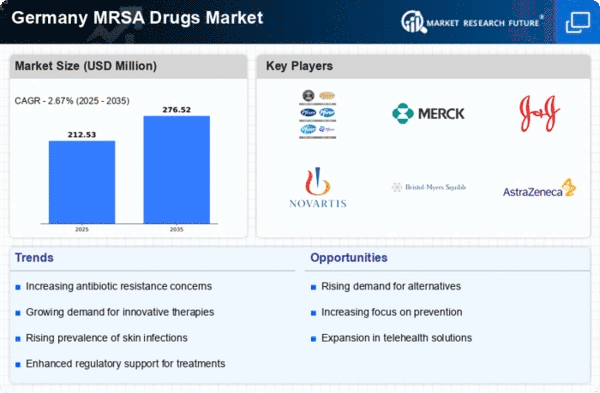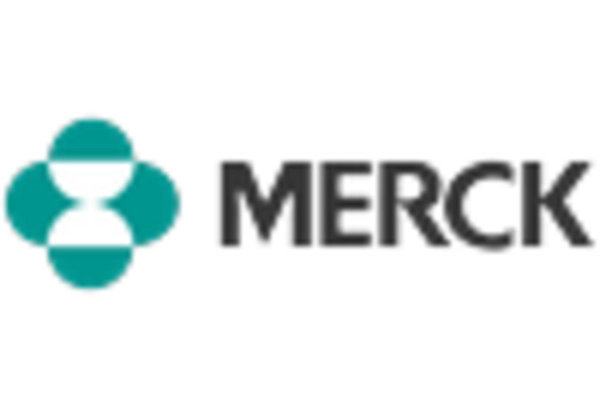Government Initiatives and Funding
Government initiatives aimed at combating antibiotic resistance play a significant role in shaping the mrsa drugs market. In Germany, the government has implemented various programs to promote research and development in antibiotic therapies. Funding for projects focused on MRSA treatment has increased, with the government allocating millions of euros to support innovative drug development. These initiatives not only encourage pharmaceutical companies to invest in MRSA drugs but also facilitate collaboration between public and private sectors. The financial backing from the government enhances the potential for breakthroughs in MRSA treatment, thereby driving market growth. Furthermore, public health campaigns aimed at educating healthcare providers and the general population about MRSA contribute to the overall awareness and demand for effective drugs in the market.
Increasing Incidence of MRSA Infections
The rising incidence of MRSA infections in Germany is a critical driver for the mrsa drugs market. Reports indicate that the prevalence of MRSA in healthcare settings has been increasing, with estimates suggesting that approximately 30% of staphylococcal infections are caused by MRSA. This trend necessitates the development and availability of effective MRSA drugs to combat these infections. Hospitals and healthcare facilities are under pressure to manage these cases effectively, leading to an increased demand for innovative treatment options. The growing awareness among healthcare professionals regarding the need for effective MRSA management further fuels the market. As a result, pharmaceutical companies are investing in research and development to create new antibiotics specifically targeting MRSA, thereby expanding the mrsa drugs market in Germany.
Rising Awareness of Antibiotic Resistance
The increasing awareness of antibiotic resistance among healthcare professionals and the public is a driving force in the mrsa drugs market. In Germany, educational campaigns have been launched to inform stakeholders about the implications of antibiotic misuse and the importance of developing effective MRSA treatments. This heightened awareness is leading to a greater demand for MRSA drugs as healthcare providers seek to implement effective treatment protocols. Additionally, patients are becoming more informed about their treatment options, which may influence their preferences for specific MRSA therapies. The focus on responsible antibiotic use and the need for new treatment options are likely to drive market growth as stakeholders recognize the urgency of addressing MRSA infections.
Growing Investment in Pharmaceutical Research
The growing investment in pharmaceutical research and development is a pivotal driver for the mrsa drugs market. In Germany, both public and private sectors are increasing their funding for research initiatives aimed at discovering new antibiotics. This investment is crucial in addressing the challenges posed by MRSA, as traditional antibiotics become less effective. Pharmaceutical companies are allocating substantial resources to develop innovative therapies that can effectively target MRSA strains. The competitive landscape is evolving, with numerous companies entering the market to capitalize on the demand for effective MRSA drugs. As research progresses and new drugs are developed, the market is expected to expand, providing healthcare providers with more options to combat MRSA infections.
Technological Advancements in Drug Development
Technological advancements in drug development are significantly influencing the mrsa drugs market. Innovations such as high-throughput screening and advanced molecular techniques have accelerated the discovery of new antibiotics targeting MRSA. In Germany, research institutions and pharmaceutical companies are leveraging these technologies to identify potential drug candidates more efficiently. The integration of artificial intelligence and machine learning in drug discovery processes is also gaining traction, potentially reducing the time and cost associated with bringing new MRSA drugs to market. As these technologies continue to evolve, they may lead to the introduction of novel therapies that can effectively combat MRSA infections, thereby expanding the market. The ability to rapidly develop and test new drugs is crucial in addressing the urgent need for effective MRSA treatments.
















